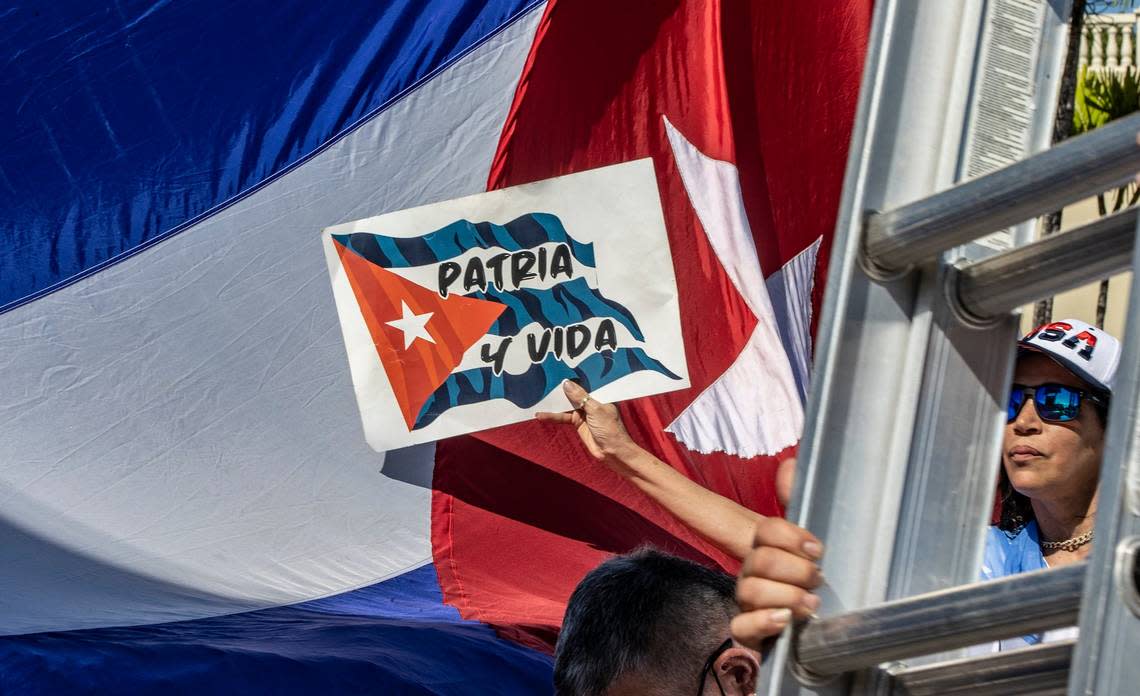A country on edge: Cubans share images of protests, police beatings and healthcare crisis

Recent videos and publications on social media show how volatile the situation in Cuba remains a year after historic anti-government protests shook the island, underscoring the country’s deteriorating economic and human rights situation.
With the hashtags #Cubapalacalle — Cuba on the streets — and #SOSCuba, social media users have been sharing images of anti-government protests and police beatings, as well as the stories of Cubans suffering or dying because of public health failures.
▪ Cubans keep protesting despite crackdown
Tired of the frequent blackouts, residents of Los Palacios, a town in the westernmost province of Pinar del Río, took to the streets late Thursday night to protest against the government. It is difficult to assess the magnitude of the demonstration because the videos were shot in the darkness during an electricity outage. Still, a crowd can be heard insulting Cuba’s leader Miguel Díaz-Canel, which is a crime under Cuban law.
The demonstration happened just days after the one-year anniversary of the July 11, 2021, protests. Hundreds of Cubans who joined those protests were given long prison sentences and many were accused of political crimes like sedition.
Cuban state media later acknowledged an “incident” in Los Palacios.
Netblocks and other internet tracking platforms confirmed there were internet outages in the early morning on Friday, as the government shut down the service to stop the images from circulating.
That same night in Havana, a mother of two, including one child with disabilities, protested the conditions of her home in a park near the Capitol, where the National Assembly meets. She attracted a small crowd, according to images shared on social media.
▪ Police abuses caught on camera
Videos of special forces agents known as Black Berets and police officers beating people attending the Conga de Los Hoyos parade in Santiago de Cuba circulated on social media on Saturday.
In a separate event in Habana del Este, a neighborhood east of Havana, police officers violently arrested 23-year-old Alejandro Tamayo Chacón, according to videos recorded by his relatives.
2/3 pic.twitter.com/cNHn58kkQc
— Yannis Estrada (@YannisEst) July 16, 2022
Miami TV station Telemundo 51 reported Saturday he was one of the three Cuban migrants who were interdicted by the U.S. Coast Guard on July 9 while attempting to reach U.S. shores on a pedal boat. He was repatriated to Cuba on July 13.
His pregnant wife told Telemundo 51 he was accused of “resisting” authorities and stealing the pedal boat, and that police officers broke into their house without a warrant. Showing the poor conditions of their home, his mother told Telemundo 51 that her son wanted to emigrate so they could “live well at least once in their lives.”
▪ A collapsed health system
After years of budget cutbacks in the health system to prioritize the construction of hotels for tourists, the COVID-19 pandemic exposed the deteriorated state of Cuban healthcare. A new hemorrhagic dengue fever epidemic is again straining the system, exposing the lack of medicines, basic supplies and ambulance services.
At 4 p.m. Thursday, Maritza Barrios posted a desperate call on Facebook.
“I NEED AN AMBULANCE; MY SON IS DYING,” she wrote in all caps.
She said her son, 26-year-old Andy Agüero Barrios, who was autistic and blind, was in urgent need of a transfusion. They had been at a local clinic in El Cotorro, a neighborhood on Havana’s periphery, since Thursday morning, and they needed an ambulance to get him into a hospital.
The nearest hospital was only nine miles away, but when one ambulance vehicle showed up, she said, the crew wouldn’t take him. She said she had no other means to take him to a hospital.
Her son died at 6 p.m., Barrios said in another post.
Cuba’s Ministry of Health said the young man was eventually taken to the hospital and died of cardiorespiratory arrest. But the statement includes information attempting to shift blame onto the family. For example, the ministry said the family had refused to get him admitted earlier and that they also refused an autopsy.
The statement does not mention the long wait for the ambulance but adds that authorities were aware of complaints about the “quality of care” provided by an ambulance’s crew. The ministry said the crew would be disciplined without providing more details.
Deyvis Lawton, a medic who said he was on that ambulance, said on Facebook that there was only one ambulance to respond to emergencies in four Havana municipalities.
On Friday, another desperate mother posted pictures on Facebook of her daughter in a Havana hospital bed where she was admitted with hemorrhagic dengue fever. The mother, Rosmery García, said her daughter had anemia because of the bleeding provoked by the disease, but doctors were pushing to dismiss her without a transfusion.
“Better kill me already because I can’t stand seeing my children like this,” García said.
Addressing Cuban leader Díaz-Canel, she urged him to stop blaming the U.S. embargo for all the country’s ills.
“Either leave this country or send us to another country,” she wrote. “Canel, killer of children.”
